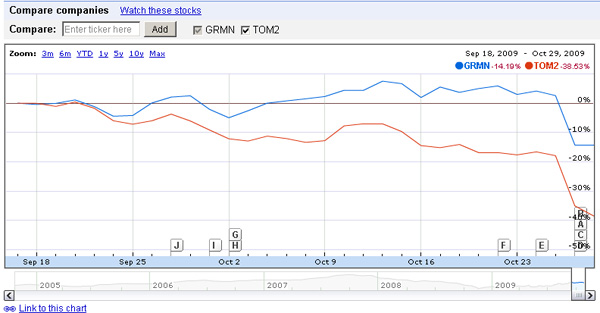Wow. I mean really, WOW! One announcement of a Web based product that is currently inferior to your product that only runs on a very limited number of devices and your company looses Billions of dollars. Wow.
This is what happened to TomTom and Garmin stock prices when Google announced Maps Navigation. I suspect their stock prices will come back *some* but not to their previous levels. A new bar has been set and it’s very, very low. There was a certain amount of value in those companies because there existed a barrier to entry: satellites, relatively expensive hardware, distributors, supply chains, etc.
Google had all of that or didn’t need it. New rule book and they made it up.

Now a similar announcement by a different company wouldn’t have had this effect. But it’s Google. And Google doesn’t play the way your company does. It doesn’t have the same cost structures and it has a major cash cow that can fund that free product for many years before it becomes profitable. Basically long enough to drive you out of business. (This reminds me of another company in the 80′s and 90′s)
Google scares companies. But Google is also starting to scare people. It was bad enough when the only real data they had on you was your publicly available data and your search history. But now imagine a scenario that Louis Gray is toying with, where someone goes all Google.
You run the Chrome OS, which is basically the Chrome Browser running on Linux. You use only the Google Docs product and of course Search and Gmail, then Google Chat and Google Reader. Now throw in to that an Android phone with GPS and Maps Navigation.
Google knows every Web page you visit, every search you make and has your documents and email in their searchable database, plus they know where you are at any given point (because no one goes further than 10 feet from their phone anymore).
As a user you can control the products you use and where your data is stored (at least to some degree). But as a company how do you compete with this?
A few days ago I suggested every company needs to be reevaluating all aspects of their business and I meant it.
Going even further back, two years ago (ironically when writing about Google and their effect on your business model) I suggested to disrupt your own business model. Don’t wait for Google or someone else to disrupt your model do it yourself. At least theoretically. This way you’re less caught off guard and maybe even come up with a whole new business.
HP did this when they launched their Ink Jet devision to compete with their highly profitable LaserJet devision. Google even did this when they launched Google Wave, which is *supposed* to be a replacement for email.
What does your disruptor look like?
Related articles by Zemanta
- Google is still taking over the world… (shannonturlington.com)
- Chrome Nears 5% Market Share (thenextweb.com)
- Google and the Deadly Power of Data [Comment] (gizmodo.com)
- Why it doesn’t matter how big Twitter gets (newcommbiz.com)
- Best blog title of the week: Spite Is Not a Business Strategy #feedly (newcommbiz.com)
Similar Posts:
- Why it doesn’t matter how big Twitter gets
- The Life and Death of Darcy Validate by Twitter
- Will Apple Finally Have to Embrace Social Media?
# of Comments 4
# of Comments 6
# of Comments 8